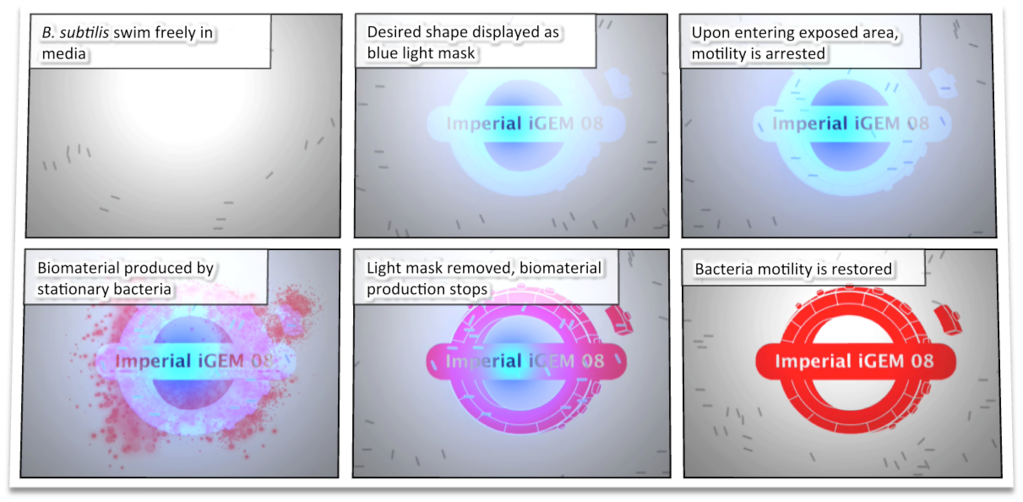Team:Imperial College
From 2008.igem.org
(Difference between revisions)
m |
|||
| (41 intermediate revisions not shown) | |||
| Line 3: | Line 3: | ||
{{Imperial/Box1|| | {{Imperial/Box1|| | ||
| - | <html><center><img width=" | + | <html><center><img width="830px" src="https://static.igem.org/mediawiki/2008/9/94/Imperial_2008_Title.png"></center><font size="4pt"></html><center>'''<br>For the 2008 iGEM competition, the Imperial College Team aims to develop a genetically-engineered Biofabricator, using the Gram-positive bacterium ''Bacillus subtilis'' as our chassis. Our Biofabricator aims to produce self-assembling biomaterials in specified 3D shapes, using light as the trigger.'''<br><br><html></font> |
| - | <center>'''For the 2008 iGEM competition, the Imperial College Team aims to develop a genetically-engineered Biofabricator, using the Gram-positive bacterium Bacillus subtilis as our chassis. Our Biofabricator aims to produce self-assembling biomaterials in specified 3D shapes, using light as the trigger.'''< | + | <table style="color:#2B48B3;background-color:transparent;"><tr><td><img style="vertical-align:center;" width="380px" src="http://i59.photobucket.com/albums/g305/Timpski/Logo1.png"></td> |
| - | + | <!--<td style="text-align:center;"><br><i><font size="3pt" style="border:2px solid;padding:7px;"><b><a target="_blank" href="https://2008.igem.org/Team:Imperial_College/BioBricks">45 B. subtilis BioBricks submitted!</a></b></font><br><br><font size="3pt" style="border:2px solid;padding:7px;"><b><a target="_blank" href="https://2008.igem.org/Team:Imperial_College/Major_Results">BioBrick Characterisation</a></b></font><br><br><font size="3pt" style="border:2px solid;padding:7px;"><b>Chassis Characterisation</b></font><br><br><font size="3pt" style="border:2px solid;padding:7px;">Cell <b><a target="_blank" href="https://2008.igem.org/Team:Imperial_College/Motility">motility tracking</a></b></font><br><br><font size="3pt" style="border:2px solid;padding:7px;">Extensive <b><a target="_blank" href="https://2008.igem.org/Team:Imperial_College/Dry_Lab">modelling</a></b></font></i>--> | |
| - | + | </td></tr></table><br><hr><center><font size="4pt" style="border:0px solid;padding:10px;">Pushed for time? <b><a target="_blank" href="https://2008.igem.org/Team:Imperial_College/Summary">Project Summary</a> | <a target="_blank" href="https://2008.igem.org/Team:Imperial_College/Summary#Results">Achievements</a> | Growing Clothes: <b><a target="_blank" href="https://2008.igem.org/Team:Imperial_College/Cellulose">BioCouture</a></b></font></center><hr><br></html> | |
| - | + | ||
| - | + | ||
| - | + | ||
|}} | |}} | ||
| - | {{Imperial/Box1|Overview|*First by utilising an endogenous light-sensing mechanism, the bacteria is captured in the desired location using 3D holography. | + | {{Imperial/Box1|'''<html><font size=6px>Overview</font></html>'''| |
| + | The following video is a simplified representation of how we want our system to work... | ||
| + | <html><center><object width="425" height="350"> <param name="movie" value="http://www.youtube.com/v/pqEmKkY5DxA"> </param> <embed src="http://www.youtube.com/v/pqEmKkY5DxA" type="application/x-shockwave-flash" width="425" height="350"> </embed> </object></center></html> | ||
| + | *First by utilising an endogenous light-sensing mechanism, the bacteria is captured in the desired location using 3D holography. | ||
*Next bacterial locomotion is suspended in the region of interest using a recently-discovered clutch mechanism. This involves disengaging the flagellum from the motor protein. | *Next bacterial locomotion is suspended in the region of interest using a recently-discovered clutch mechanism. This involves disengaging the flagellum from the motor protein. | ||
*Finally, when our bacteria are stationary in the correct location, the biomaterial production is triggered. These biomaterials can self-assemble to form a 3D bio-scaffold. | *Finally, when our bacteria are stationary in the correct location, the biomaterial production is triggered. These biomaterials can self-assemble to form a 3D bio-scaffold. | ||
| - | <html><center><img width=" | + | <html><center><img width="800px" src="http://i59.photobucket.com/albums/g305/Timpski/Comic_No_Title.png"></center></html> |
| - | + | <br> | |
| - | + | '''<html><center><font size=4px></html>Please continue on to our project pages - you may wish to start with our [[Team:Imperial_College/Project |>>> Project Specifications >>>''']]<html></font></center></html> | |
| - | + | <br> | |
| - | + | }} | |
| - | Please continue on to our project pages - you may | + | |
<hr><br> | <hr><br> | ||
{{Imperial/Box1|| | {{Imperial/Box1|| | ||
The Imperial College Team 2008 has received sponsorship from a number of generous companies. We are grateful for their kind support. | The Imperial College Team 2008 has received sponsorship from a number of generous companies. We are grateful for their kind support. | ||
| - | <html><center><a href="http://www.bio-rad.com/"><img height="40px" src="http://i59.photobucket.com/albums/g305/Timpski/Biorad.png"></a><a href="http://www.fisher.co.uk/"><img height="50px" src="http://i59.photobucket.com/albums/g305/Timpski/Fisher.png"></a><a href="http://www.geneart.com/"><img height="25px" src="http://i59.photobucket.com/albums/g305/Timpski/Geneart.png"></a><a href="http://www.vwr.com/index.htm"><img height="50px" src="http://i59.photobucket.com/albums/g305/Timpski/VWR.png"></a></center></html> | + | <html><center><a href="http://www.bio-rad.com/"><img height="40px" src="http://i59.photobucket.com/albums/g305/Timpski/Biorad.png"></a><a href="http://www.fisher.co.uk/"><img height="50px" src="http://i59.photobucket.com/albums/g305/Timpski/Fisher.png"></a><a href="http://www.geneart.com/"><img height="25px" src="http://i59.photobucket.com/albums/g305/Timpski/Geneart.png"></a><a href="http://www.vwr.com/index.htm"><img height="50px" src="http://i59.photobucket.com/albums/g305/Timpski/VWR.png"></a></center> |
| + | <center>We would also like to thank the members of the Center for Structural Biology for their help and support during our iGEM project.</center></html> | ||
}} | }} | ||
| Line 32: | Line 32: | ||
<tr><td><ul id="sddm"></html>< Previous<html></ul> | <tr><td><ul id="sddm"></html>< Previous<html></ul> | ||
</td><td><ul id="sddm"><a href="#">Back to top</a></ul> | </td><td><ul id="sddm"><a href="#">Back to top</a></ul> | ||
| - | </td><td><ul id="sddm"></html>Next ><html></ul> | + | </td><td><ul id="sddm"></html>[[Team:Imperial_College/Project |Next >]]<html></ul> |
| - | </td></tr></table> | + | </td></tr></table></center></html> |
| - | </center></html | + | |
| - | + | ||
Latest revision as of 09:06, 30 October 2008
|
||||||||||||
 "
"







